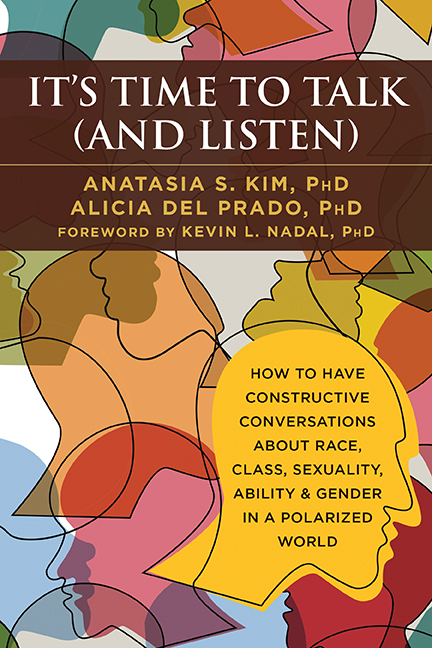By Anatasia S. Kim, PhD, coauthor of It’s Time to Talk (And Listen)
Yes, absolutely. As long as you’re not looking to mainstream news or social media for the answers.
It seems we wake up every morning thrust yet again into the eye of the hurricane. Nasty Twitter storms that only fuel divisiveness and vitriol. A vicious and unrelenting cycle of tit for tat. Honestly, these should come with a warning sign. Upsetting and harmful content: Likely to make you mad, put you in a bad mood, or even make you feel hopeless.
No doubt we are wrestling with big and serious issues in our world: Refugee crises, threat of nuclear war, wealth inequality, reproductive rights, mass incarceration, marriage equality, religious conflicts, and more.
Not surprisingly, all these come with strong emotions. They also come with conflicting ideas about blame and solutions. Everyone has a righteous opinion, and mounting evidence that they are right and others wrong. The result? Rising hurricane categories, with no end in sight.
Emotional Reactivity vs. Mindful Responding
Managing our emotions is no easy task. No matter who you are, we can all become prey to emotional reactivity. Add to that, controversial topics on culture and politics. Well then, we just might have a runaway train on our hands.
So, how do we tame our propensity for emotional reactivity? How do we instead respond deliberately and mindfully when stakes are high and strong emotions brimming?
The Kim Constructive Conversations Model offers an answer. Here are some critical factors to consider from its eight-step model. These include staying in relationship connection, giving people the benefit of the doubt, and inviting dialogue.
Stay in Relationship Connection
This will be the vessel through which your sensitive content will travel.
Let’s not kid ourselves. Even when our intentions are magnanimous, pointing out a microaggression is not going be an easy pill to swallow, no matter who’s on the receiving end. In today’s sociopolitical climate, situations like this are riddled with the potential for emotional reactivity, if not volatility. There is really no way that a message such as, “What you said was racist,” is going to land well. At least, not as a standalone.
So, prepare your delicate package with extra trimmings to ensure it gets to its destination.
How?
When sending out your cargo (i.e., raising a sensitive issue), make sure there is a viable vessel (i.e., relationship connection) through which it can safely travel.
Give People the Benefit of the Doubt
We are all familiar with the Golden Rule. Knowing what we should do, however, is one thing. Doing it is an entirely different story. Especially when strong emotions are running the show.
Yes, the other person might be wrong. Shoot, they might not even deserve your time and consideration. But, if you hope to move the needle, you have to be willing to do what others cannot or will not do. You gotta dig deep. You have to give others the benefit of the doubt. Otherwise, you’re no different than anyone else—superficially calling out what you perceive to be others’ shortcomings and ignorance. This only maintains status quo. Or worse, you embolden the growing tribalism of us vs them. Still stuck.
I don’t know about you, but personally, I’m tired of spinning in circles. We’ve been here. Forever, it seems. Done that. We need a different approach.
As much as we might want, many, if not all, of our sociopolitical challenges cannot be solved in isolation. Do we actually believe individual nations with their own rules and regulations will solve the global crisis of climate change? Let’s not fool ourselves. The increasingly warming planet does not, and will not, discriminate. It will not recognize any international borders. Eventually, it will take down the whole Titanic.
So, be generous. Give others the benefit of the doubt. You might be “right” in this particular situation about this particular issue. But surely, every one of us has been wrong about something, sometime. Golden Rule. It works. Use it.
Invite Dialogue
I know you know, but let me state the obvious. Many of us, including myself, often forget that having a constructive conversation is about talking with, and not at, someone. It’s also about agreeing to listen, in addition to talking. It’s the unspoken rule that we expect others to follow. But honestly, many of us have a hard time following it ourselves. And when the topic of conversation involves culture and politics? Good luck!
Why does this happen?
When dealing with strong emotions and controversial issues, unintentionally, many of us use “listening time” to prepare our rebuttals. Then once it’s our turn, we hit the ground running. Shooting off arguments, one after another, to corroborate our position. Before we know it, our conversational goal becomes an individual one—to win the argument.
Listening is hard. It’s hard to put aside our own feelings and opinions, and purposefully create mental and heart space for others’—often disagreeable, if not blatantly contradictory—feelings and opinions.
So, what can we do?
We need to consciously and respectfully invite others into the conversation space. A deliberate invitation can communicate to the other person, and remind you, that you’re willing to take turns and play fair.
How to Put It All Together
So, how might the above three considerations be integrated in broaching constructive conversations? Here’s an example:
“Alex, I’ve been thinking about the discussion we had yesterday during our meeting. There was something you said that’s been bothering me [the sensitive cargo]. I may have misunderstood you [benefit of doubt]. So, I wanted to follow up because I am invested in our work and professional relationship [relationship connection]. I would appreciate it, if you would be willing to talk with me about this [invitation to dialogue].”
Your Turn
Now it’s your turn. Whether you’re a psychotherapist, or someone wishing to make an impact on important matters in your life, challenge yourself. Be brave. Dare to broach conversations that will move the needle and help us get unstuck. Together we can do this. It’s time to talk and listen!
Anatasia S. Kim, PhD, is a tenured associate professor at The Wright Institute in Berkeley, CA. In addition to teaching, she has a private practice in Berkeley, CA, specializing in treating adolescents/young adults with anxiety disorders, depression, and neurocognitive deficits using cognitive behavioral therapy (CBT). In recent years, she served as president of the Alameda County Psychological Association, chair of the California Psychological Association Immigration Task Force, and diversity delegate of the California Psychological Association. She has presented and published in the areas of cultural competence and training, pipeline for historically underrepresented students, immigration, advocacy and leadership, and women of color in academia.



 2024 Peace Playbook: 3 Tactics to Avoid Clashes with Your Partner
2024 Peace Playbook: 3 Tactics to Avoid Clashes with Your Partner